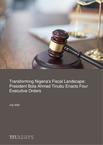
Transforming Nigeria's Fiscal Landscape: President Bola Ahmed Tinubu Enacts Four Executive Orders
Following the need to address the concerns of the masses (businesses and individuals) concerning recent changes to taxes & duties introduced by the Finance Act 2023 and the Fiscal Policy Measures 2023, the President of the Federal Republic of Nigeria, Bola Ahmed Tinubu, on Thursday, 6 July 2023, signed four (4) executive orders. These orders signify the President’s commitment to implementing key reforms, easing the tax burden on businesses, and addressing critical issues affecting the nation’s tax space. With these orders, President Bola Ahmed Tinubu has further confirmed his desire to promote economic growth and development across Nigeria.
Major Highlights of the Executive Orders
- Finance Act (Effective Date Variation) Order, 2023: This order defers the commencement date of the Finance Act 2023 from 1 May 2023 to 1 September 2023. The implication of this is that the relevant changes to taxes and duties introduced by the Act (except those suspended by the President through other Executive Orders) will now be effective from 1 September 2023. This is to align with the minimum notice period of 90 days as contained in the 2017 National Tax Policy. While this deferment would enable businesses and individuals to have enough time to prepare and adjust to present realities, it is important to note that this would enhance trust in the government and consistency in our policies.
- Customs, Excise Tariff (Variation) Amendment Order, 2023: This order shifts the commencement date of the relevant changes to the Customs Excise Tariff (CET) to 1 August 2023. It is obvious this order has taken cognizance of the plight of the Manufacturers Association of Nigeria (MAN) and other relevant stakeholders who have aired their voices on the implications of recent amendments to taxes/duties. There have been a series of changes to the Customs Excise Tariff introduced by both Fiscal Policy Measures (FPM) 2022 and 2023. While the changes introduced by the Fiscal Policy Measures 2022 are barely one year, the Federal Government has introduced other changes through the Fiscal Policy Measures 2023 and tariff amendments without considering the impact this could have on business operations. However, the implementation of the FPM 2023 has generated serious concerns among businesses that are majorly impacted by the changes introduced, considering the present economic situation of the country.
- An Order suspending the 5% excise tax on telecommunication services and the excise duties escalation on locally manufactured products. It is important to note that the excise tax on telecommunication services was first introduced by the Finance Act 2020 with 1 January 2021 as the commencement date. Following a series of concerns raised by the Telcos and other operators within the industry, the excise tax was suspended though reconsidered in 2022 but without any implementation. However, the Fiscal Policy Measures 2023 and the Finance Act 2023 further reaffirmed the implementation of the excise duty on telecommunication services. With this order, the long-existing controversy around the implementation of excise duty on telecommunication services will be properly revisited. This will enable the Federal Government to carry out a holistic analysis of the sector, justify the introduction of excise duty and align with the nation’s Fiscal Policy objectives.
The suspension of excise duties escalation on locally manufactured products is a welcome development at present, considering the present economic situation. Local manufacturing businesses can thrive easily in an environment devoid of unnecessary bottlenecks, particularly in the aspect of multiple or high taxes (duties) to pay.
- An Order suspending the introduction of Green Tax on Single-Use Plastics and Import Tax Adjustment on certain vehicles. Since the release of the circular on the approved implementation of the Fiscal Policy Measures (FPM) 2023 on 20th April, some investors in plastic operations have started analyzing the impact of this tax on their investments both from the business perspective and the customers’ perspective. Though FPM 2023 failed to clarify Green Tax in relation to the tax base, the responsible/paying party, the collection agent, the mode of collection, the operating framework, and the enabling legislation among others, its’ suspension will be an opportunity to provide clarity on certain areas if it is to be reintroduced.
As for the introduction of Import Tax Adjustment (ITA) on certain vehicles, this may not be a perfect time but the need to position our economy for business and environmental sustainability cannot be over-emphasized, given the effect of the emissions from certain categories of vehicles.
Our concluding remarks
We commend President Bola Ahmed Tinubu for reviewing the recent Fiscal Policy Measures amendments and the Finance Act 2023, particularly to ensure a conducive business environment and to align with the 90 days notice as directed by the 2017 National Tax Policy. The recently signed Executive Orders are considered a right step in the right direction in the interest of Nigerians and everyone doing business in Nigeria.
Additionally, businesses and individuals will have some relief from the suspended taxes and duties with adequate time to plan their operations in preparation for the anticipated economic impact.
During this period of suspension of recently introduced taxes (duties), we expect the government to seize that opportunity to review and align the nation’s fiscal policy objectives to address the challenges of multiple taxes for effective revenue harmonization.
We also expect that relevant steps will be taken to achieve the following:
- Tax and economic reforms.
- Macroeconomic objectives.
- Strengthen collaboration among Federal government agencies.
- Creating an enabling environment for businesses to thrive.
- Cushion the effect of subsidy removal of Premium Motor Spirit (PMS) on the masses.
- Sustainable business environment.



